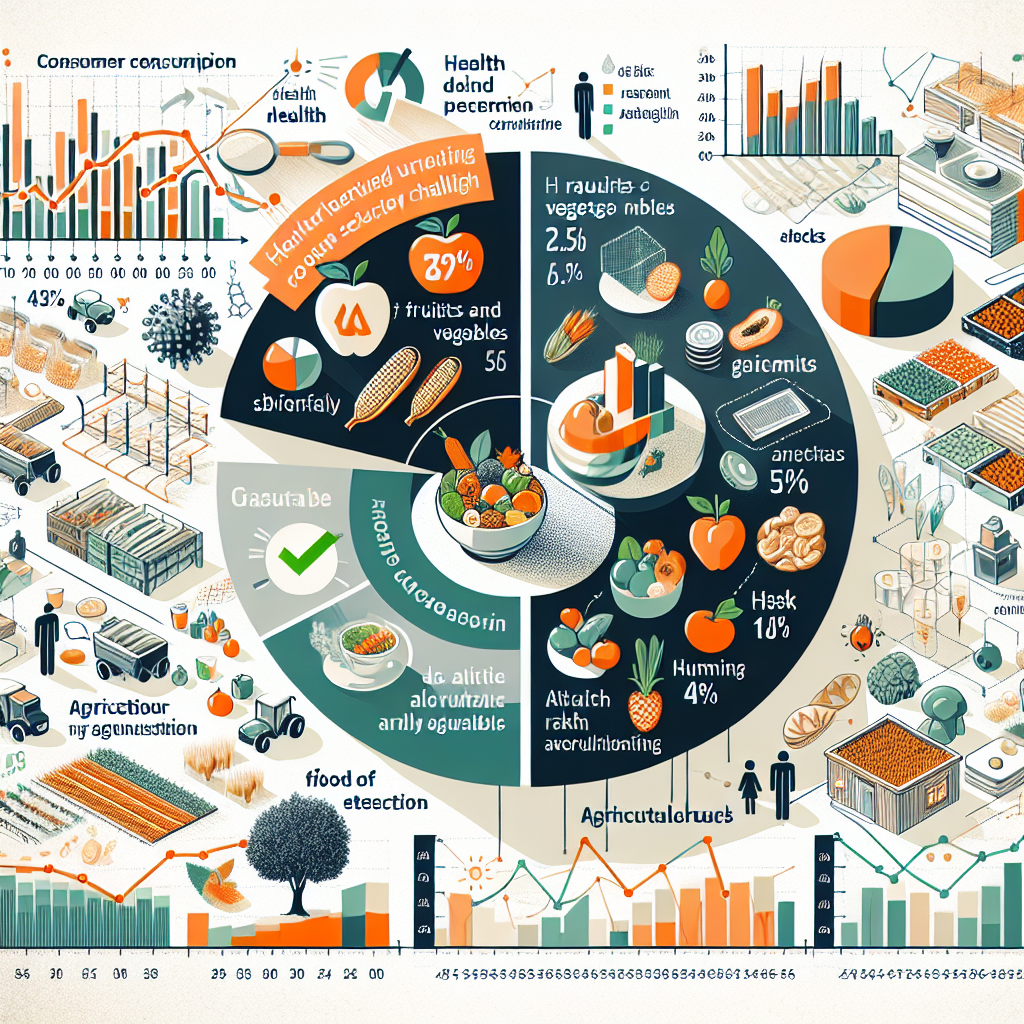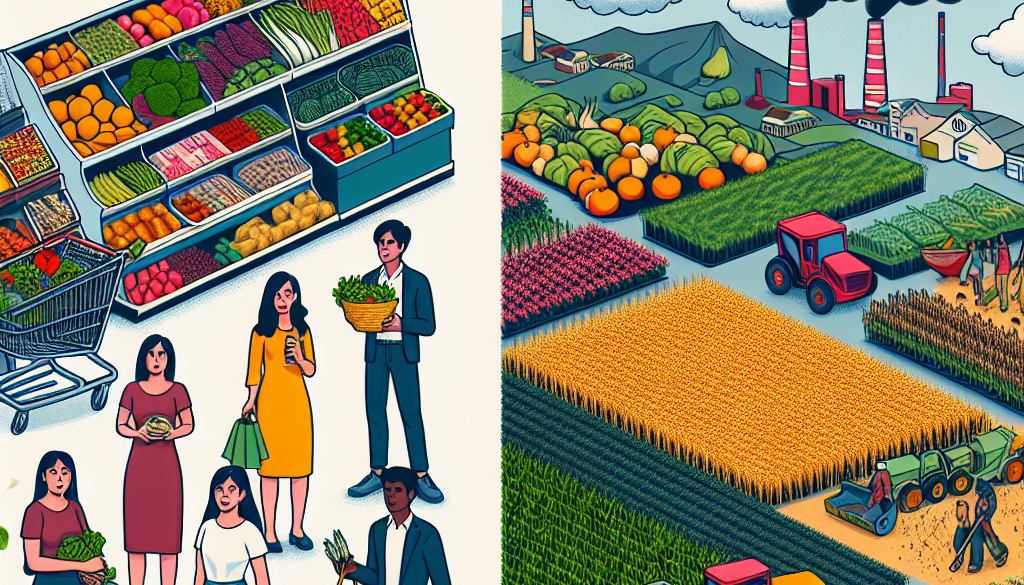Food Security Challenges: Health-driven and Consumer Consumption of Fruits and Vegetables Still Not Affecting Agricultural Usage and Impact on Risk
-
Table of Contents
- Food Security Challenges and the Paradox of Fruit and Vegetable Consumption
- The Current State of Fruit and Vegetable Consumption
- Agricultural Practices and Environmental Impact
- Challenges in Sustainable Agriculture
- Consumer Influence on Agricultural Practices
- Reducing Risk and Ensuring Food Security
- Conclusion
- ETprotein’s Contribution to Sustainable Nutrition
Food Security Challenges and the Paradox of Fruit and Vegetable Consumption

Despite the increasing health-driven consumer demand for fruits and vegetables, the agricultural sector continues to face significant challenges in meeting this demand sustainably. The paradox lies in the fact that while consumers are eating more fruits and vegetables, the agricultural practices used to grow these crops have not significantly shifted towards reducing environmental impact and risk. This article delves into the complexities of food security, consumer trends, and the agricultural industry’s response to these evolving demands.
The Current State of Fruit and Vegetable Consumption
Recent years have seen a marked increase in the consumption of fruits and vegetables, driven by a growing awareness of their health benefits. Diets rich in these foods are associated with a reduced risk of chronic diseases such as heart disease, stroke, and certain cancers. Despite this, the global population is still not consuming enough fruits and vegetables to meet the World Health Organization’s recommended daily intake of at least 400 grams per person.
- Statistics show that only a small percentage of adults and children consume the recommended daily servings.
- Consumer trends indicate a preference for organic and locally sourced produce, reflecting a shift towards more health-conscious decisions.
Agricultural Practices and Environmental Impact
While consumer demand for fruits and vegetables is on the rise, the agricultural sector’s practices have been slow to adapt. Traditional farming methods often involve the use of synthetic pesticides and fertilizers, which can have detrimental effects on the environment, including soil degradation, water pollution, and loss of biodiversity.
- Intensive farming practices contribute to greenhouse gas emissions, exacerbating climate change.
- There is a growing need for sustainable agricultural practices that minimize environmental impact while meeting consumer demand.
Challenges in Sustainable Agriculture
Transitioning to sustainable agricultural practices presents several challenges for farmers and the industry as a whole. These include:
- The high cost of transitioning to organic farming, which can be prohibitive for small-scale farmers.
- Lack of access to markets for sustainably grown produce, particularly in developing countries.
- Insufficient government policies and subsidies to support sustainable agriculture.
Despite these challenges, there are opportunities for innovation and improvement. For instance, precision agriculture, which uses technology to optimize field-level management regarding crop farming, can help reduce waste and environmental impact.
Consumer Influence on Agricultural Practices
Consumers have the power to influence agricultural practices through their purchasing decisions. By choosing sustainably grown fruits and vegetables, consumers can drive demand for environmentally friendly farming methods. However, this influence is often limited by factors such as:
- Availability and accessibility of sustainably grown produce in certain regions.
- Higher costs of organic fruits and vegetables compared to conventionally grown counterparts.
- Lack of awareness or misinformation about the benefits of sustainable agriculture.
Reducing Risk and Ensuring Food Security
Ensuring food security while reducing environmental risk is a complex task that requires a multifaceted approach. Strategies to achieve this goal include:
- Investing in research and development to improve sustainable farming techniques.
- Implementing policies that support small-scale farmers and sustainable practices.
- Encouraging collaboration between governments, NGOs, and the private sector to promote food security.
By addressing these areas, the agricultural sector can work towards a system that not only meets the health-driven demand for fruits and vegetables but also protects the environment and ensures long-term food security.
Conclusion
The challenges of food security in the context of increasing consumption of fruits and vegetables are multifaceted. While consumer trends are shifting towards healthier diets, the agricultural sector must adapt to meet this demand sustainably. The key to success lies in overcoming the barriers to sustainable agriculture, leveraging consumer influence, and implementing policies that support environmental stewardship. By doing so, we can ensure that the health benefits of increased fruit and vegetable consumption do not come at the expense of our planet’s health.
ETprotein’s Contribution to Sustainable Nutrition
In light of the challenges faced by the agricultural sector, companies like ETprotein are stepping up to offer sustainable protein alternatives. ETprotein’s range of organic bulk vegan proteins, including rice, pea, and various seed proteins, provides consumers with environmentally friendly options that complement the consumption of fruits and vegetables. Their commitment to non-GMO, allergen-free products with high purity levels ensures that consumers do not have to compromise on quality or sustainability.
For those looking to enhance their diet with sustainable protein sources, ETprotein’s offerings are an excellent choice. Their products cater to a wide range of industries, from food and beverage to sports nutrition and health and wellness, making it easier for consumers to make environmentally conscious choices without sacrificing nutritional value.
About ETprotein:
ETprotein, a reputable protein and L-(+)-Ergothioneine (EGT) Chinese factory manufacturer and supplier, is renowned for producing, stocking, exporting, and delivering the highest quality organic bulk vegan proteins and L-(+)-Ergothioneine. They include Organic rice protein, clear rice protein, pea protein, clear pea protein, watermelon seed protein, pumpkin seed protein, sunflower seed protein, mung bean protein, peanut protein, and L-(+)-Ergothioneine EGT Pharmaceutical grade, L-(+)-Ergothioneine EGT food grade, L-(+)-Ergothioneine EGT cosmetic grade, L-(+)-Ergothioneine EGT reference grade and L-(+)-Ergothioneine EGT standard. Their offerings, characterized by a neutral taste, non-GMO, allergen-free attributes, with L-(+)-Ergothioneine purity over 98%, 99%, cater to a diverse range of industries. They serve nutraceutical, pharmaceutical, cosmeceutical, veterinary, as well as food and beverage finished product distributors, traders, and manufacturers across Europe, USA, Canada, Australia, Thailand, Japan, Korea, Brazil, and Chile, among others.
ETprotein specialization includes exporting and delivering tailor-made protein powder and finished nutritional supplements. Their extensive product range covers sectors like Food and Beverage, Sports Nutrition, Weight Management, Dietary Supplements, Health and Wellness Products, and Infant Formula, ensuring comprehensive solutions to meet all your protein needs.
As a trusted company by leading global food and beverage brands and Fortune 500 companies, ETprotein reinforces China’s reputation in the global arena. For more information or to sample their products, please contact them and email sales(at)ETprotein.com today.












